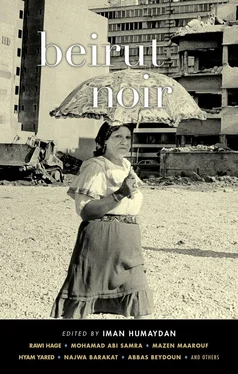When will he hear Yara’s voice? When will he contemplate her eyes, open to the world? He ran all night long. He ran in his sleep, listening to himself panting. In the dream he arrived at the fourth floor of the hospital. He dashed through the corridor leading to the intensive-care unit. The lights were out. For the first time he recognized the darkness in that room, as if it were abandoned. Darkness enveloped the place and there was no sign of the young woman at all, nor of her mother. There was no one there to ask about what happened to the injured woman who was here just a few hours earlier. Then he woke up to the sound of the alarm clock.
When he reaches the fourth floor, his colleague who had been monitoring her was being paged. Her heart suddenly got tired; his heart almost stops. He still doesn’t understand why he cares so much about her. It’s as if his heart is suspended with her heart. He feels an exhaustion that he’s never experienced before. He peers out the window of his clinic in the hospital at the Beirut sky, muttering, “Oh Beirut sky, save me.” Then he carries on with his day. Her face is an enigma, and she is slipping through his fingers. When he enters her room, he tries to evaluate her sleeping face. If she wakes up, he’ll have a brand-new life.
Originally written in Arabic.
Without a Trace
by Mohamad Abi Samra
Raouché
I stopped walking in the middle of a path in the public park. Images, ideas, echoes of words sunk into my wandering consciousness. I was struck by the memory of a laughing, silent face, but I don’t know whose. Absentmindedly, I glimpsed a feeble sunbeam on a row of trees at the end of the street where I begin my evening walk a bit before sunset every day. A young woman on a bicycle, wearing fancy exercise gear, passed me by. Then she crossed back in front of me and gave me a curious glance, making me realize I was standing frozen like a statue in the middle of the empty path. I smiled and waved at her, while she wound away on her bike down another path, fading from sight.
Why did I smile at her? Did she notice the wave of my hand, or did it simply pass into oblivion? Like my words and movements that had sometimes started coming too late recently, it was as if a little opening had swallowed it up before it was completed. Suddenly, involuntarily, I burst out laughing. And in the little opening I noticed my own reflection in the image of that other unknown laughing face that had returned to my wandering consciousness just moments before.
When did that long, carefree laugh stop emerging from within me? I thought while quickly turning down the narrow pathway into which the bicycle woman had disappeared. I couldn’t find any trace of her. In the shadow of her absence, a bygone memory emerged. It involved my little sister Vera, whom I have not seen for years, whom I rarely call, and who rarely calls me from Paris. I’m not even sure what time and place this was.
Fast and fading, the years retreat and vanish in time. Though my body started to become sluggish without me noticing, every moment became a nice memory — like my smile and the wave of my hand. They remained precariously suspended in emptiness. Like people wandering through the public park without a trace. Like my face, giggling in the forgotten memory, which caused more than half of my life to flash by in an instant. Like the laugh, which escaped from me involuntarily just a moment ago, but which had died years before I left Beirut for Los Angeles — more than twenty years ago now.
I exited the gate of the public park. The cool, light evening breezes revived the damp skin on my face. I walked along the sidewalk, heading toward my little but recently renovated ground-floor apartment in an old three-story building.
The glow of lampposts hung motionless over the street and sidewalk. The men and women passing by, myself included, were few and distant from one another. We were a mysterious being, strange and unknown, in a transient present which perhaps makes it forget itself and who it is. Perhaps the transient present extracts it from itself or preys on it, so it separates from its life. I enjoy this fleeting presence of humans, similar to how I enjoy the frozen, suspended memories that float through my vagrant vision when I pause in front of my living room window each morning. It’s an external scene that the windowpane keeps me separated from — faraway, distant, invisible, present only in my seclusion, no one can see me but myself. Every morning, I stand behind that pane of glass, separating myself from the things in that static, outside world that makes my vision wander. I imagine myself a person in an Edward Hopper painting that I’ve inhabited and has inhabited me, by virtue of how much I’ve stared at it. I begin to think the painting depicts and narrates moments from my life.
In my Beiruti adolescence, I isolated myself from my parents and other people. I started seeking aesthetic inspiration from Edward Hopper paintings I discovered in a catalogue of his works among the books at our house in Sanayeh. Like the women in his drawings, I would sit on the chair or the bed, frozen all alone in time and place. The chair, the bed, and other things in my room were haunted by the shadows of inanimate objects, lit in the catalog’s pictures by an unknown source. They enticed me. It was the power of the deep pain in the women’s eyes staring out into that bleak, illuminated void, emanating from the emptiness that the paintings depicted.
Throughout my entire life in Beirut, nothing ever suggested that people in the city desired their time, bodies, things, and places — even their intimate ones — to be devoid of the presence of the noisy outside world and all its reverberations. Rarely did I come across someone accustomed to living in voluntary isolation — of the self, body, things — internally, in dark solitude. Whenever I recalled the Beirut which I left, it seemed to me that people lived, and I lived like that too, under the gaze of others — whether those people were actually present or not — haunted by other people’s words, looks, and echoes. I remember myself among them merely as a black bee buzzing inside a hive, as I would write on the first page of my diary days after arriving in Los Angeles.
Here I am now, in the living room of my small house, lighting a candle for my sixtieth birthday. One candle, one glass of champagne on the side table, and me in my exercise clothes, wondering what to do, where to sit in the weak light shining from the corner. It is as if I’m reliving exactly the same birthday for the second or third time: a candle, a glass of champagne... nothing. No one else but me, taking a long rest on the rocking chair, absorbed in my daydreams.
The light of the lamppost, which pours out brilliantly on the asphalt outside, keeps me company. It spills through my window, dim and evanescent on the furniture whose edges are embroidered by the nighttime shadows. For a long time I haven’t been able to bear beauty and its daytime colors, so I notice the darkness of the shadows in my house which don’t leave a trace, or a memory, for anyone but me. Even that memory of the public park has repeated itself since I started taking my evening strolls there years ago: Passersby exchange greetings and kisses. I’m used to their faces and they’re used to mine, leaving no memories or traces. Sometimes one of their faces appears to me like an image suspended in spacious, silent emptiness. It’s as if time has simply been standing still or frozen since I entered the park that first time.
On the rocking chair, I close my eyes, swinging back and forth until I lose the sense of direction, time, and place. With the rhythm of the chair’s two wooden rockers on the fur of the soft carpet beneath me, I swing and fly in the nighttime space of a city with few lights. I hear the echoes of my earlier, giggling laughter, which I imagined arose from my mouth and all of my body like crystal balls of air and light, illuminating the nightlife and the faces of the people I used to sit with in Beirut’s cafés. Was my face also illuminated during these sessions and evenings at home before the long nights of the wars in Lebanon?
Читать дальше












